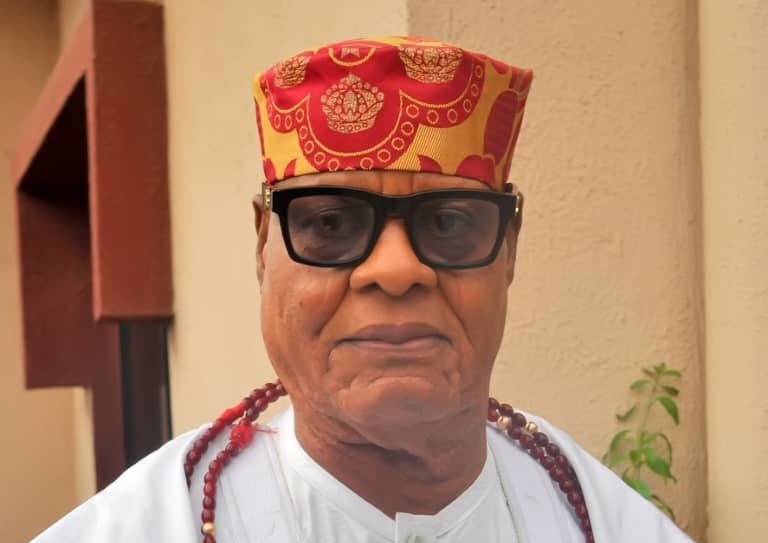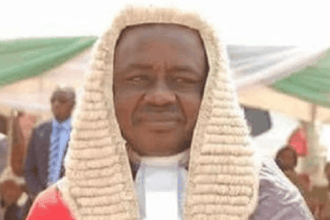The Onogie of Ewu in Esan Central Local Government Area of Edo State, His Royal Highness Jafaru Isesele I, has appealed to the new Edo State Commissioner of Police, Monday Agbonika, to enforce the Supreme Court judgment in Appeal No. SC147/2014 concerning the stool of the Onogie of Ewu.
In the judgment, the apex court ordered Prince Razak Yusuf Ojiefo, who has been occupying the Ewu palace illegally, to vacate the palace and pay a cost of three million naira to the monarch.
In a petition by his counsel, Kingsley Obamogie (SAN), addressed to the new Commissioner of Police, the foremost Esan traditional ruler stated that Agbonika’s predecessor, the redeployed Edo State Commissioner of Police, Betty Enekpen Isokpan Otimenyin, failed to provide the necessary police support to the Edo State Judiciary for the execution of the Supreme Court judgment.
This was despite a directive by the Chief Judge (CJ) of Edo State via a letter dated March 24, 2025, and signed by Mrs. M.O. Okoeguale, a Deputy Director in the Edo State High Court Registry on behalf of the CJ.
The petition, titled “RE – ENFORCEMENT OF THE JUDGMENT OF THE SUPREME COURT OF NIGERIA IN SC/147/2014: PRINCE RASAK YUSUFU OGIEFO V HIS ROYAL HIGHNESS JAFARU ISESELE I & OTHERS”, was copied to the CJ, the Attorney General of the Federation (AGF), and the Director of the Department of State Services (DSS), Edo State.
The SAN noted that although all arrangements had been made to execute the Supreme Court judgment on March 25, 2025, the Edo State Police Command under CP Otimenyin refused to accompany court bailiffs to Ewu.
According to the petition, the former CP claimed the road to Ewu was blocked and that there was tension in the town.
However, it emphasised that the police are constitutionally mandated to provide armed officers for the enforcement of court judgments—especially considering that the Supreme Court judgment on the Ewu stool had been reported in the Nigeria Weekly Law Report as Ogiefo v Isesele I [2035] N.W.L.R. Part (1975) 1.
The petition stated, “On Friday, the 19th of July, 2024, the Supreme Court of Nigeria delivered its considered judgment in the above appeal, dismissing the appeal of the appellant, Prince Rasak Yesufu Ogiefo, as devoid of merit.
“The apex court affirmed the concurrent orders of the High Court of Edo State and the Court of Appeal declaring our client as the legitimate successor to the throne of Onogie of Ewu and directed the appellant to surrender possession of the palace of the Onogie of Ewu to our client.
“For the avoidance of doubt, Certified True Copies of the enrolled orders/judgments of the High Court of Edo State, the Court of Appeal, and the Supreme Court of Nigeria relating to this matter are attached herewith and marked as Annexures A1, A2, and A3, respectively.
ALSO READ: Plateau killings: Tinubu orders security agencies to hunt down attackers
“Following the judgment, our client filed the necessary processes for its execution. These were duly processed and approved by a judge of the High Court of Edo State, pursuant to the provisions of Section 287(1) of the Constitution of the Federal Republic of Nigeria, 1999, as amended.
“By a letter dated March 21, 2025, the High Court of Edo State formally applied to you for armed police protection for the sheriffs/bailiffs of the court to execute the above Supreme Court judgment on Tuesday, March 25, 2025.
“For the avoidance of doubt, a copy of that letter and the attached process is herewith marked as Annexure A4.
“Shockingly, after all arrangements had been made for execution on March 25, 2025, the police refused to accompany the bailiffs to Ewu on the baseless ground that the road to Ewu was blocked and that there was tension in the community.
“These claims were later confirmed by us to be false. No road in Ewu was blocked on March 25, 2025, or on any other date.
“Undoubtedly, the police are mandated by both the Constitution and Section 11 of the Sheriffs and Civil Process Law to provide protection for court bailiffs during the execution of judgments. No individual or institution is above the law.
“This was reiterated by the apex court in the above case, now reported as Ogiefo v Isesele I [2025] 2 N.W.L.R. (Part 1975) 1, particularly at page 29, where the court per Agim, J.S.C., held:
‘It is trite that no institution or person, no matter how highly placed, should be allowed to treat the courts—the hallowed temples of justice—with disdain, levity, or contempt.’
The monarch stressed: “In areas where the rule of law operates, the rule of self-help by force is abandoned.
“Nigeria, being one of the countries in the world that loudly proclaims adherence to the rule of law, has no room for self-help by force.
“Once a dispute arises between a person and the government or any authority and the matter is brought before a court, thereby invoking the judicial powers of the state, it is the duty of the government to allow the law to run its course.
“Every citizen has an unqualified obligation to obey court judgments. There is a plain duty imposed on the Nigeria Police by Section 287(1) of the Constitution of the Federal Republic of Nigeria, 1999, as amended, which provides:
‘287(1) The decision of the Supreme Court shall be enforced in any part of the Federation by all authorities and persons and by courts with subordinate jurisdiction to that of the Supreme Court.’
“In the circumstances, we hereby request that you use your good offices to direct that armed police protection be provided to the bailiffs of the High Court of Edo State to enable them execute the judgment of the Supreme Court of Nigeria in SC/147/2014, entered on July 19, 2024, affirming the concurrent judgments of the High Court of Edo State and the Court of Appeal in the Ewu chieftaincy matter,” the monarch pleaded.








